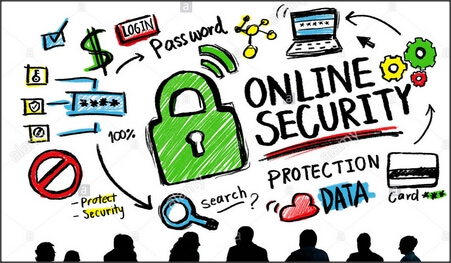From reading the latest news, to video chatting with family and scheduling medical appointments; the internet is a useful tool. However, the unfortunate reality is that cybercriminals purposely target groups of people that are less internet savvy, which includes seniors. Seniors are particularly susceptible to cyber-crime because they tend to be more wealthy, more trusting and less likely to report fraud right away. Don’t be one of millions of Americans that become victims of financial scams, identity theft, or other elderly fraud scams. Practicing online safety will be your best defense towards protecting yourself from online criminals. While online remember these top five internet safety tips and if anything seems fishy don’t proceed.
1. Don’t Give Out Your Personal Information
While online be extra cautious of where you enter your personal information. Any requests for you to provide personal information like your social security number, date of birth, address, bank account or credit card account information should be dealt with very cautiously. Is the site you’re looking at a legitimate site with a real need for that information? If not, protect yourself and do not provide your personal information.
2. Use Antivirus Software
Install antivirus or internet security software on all of your internet enabled devices from a reputable company and keep it updated. While online don’t click on strange links, pop up ads or suspicious sites. Accidents can happen to those that are the most diligent about internet safety, but this is what antivirus or internet security software is for. They will keep your devices safe from most attacks without you having to do much other than making sure it is updated and that the software regularly performs checks. We recommend scheduling your antivirus or internet security to run regular checkups so your devices stay clean from viruses, malware and spyware.
3. Choose A Strong Password Every Time
Your passwords are your first line of defense when it comes to keeping your online accounts safe. Choose passwords that are minimum 12 characters long and consist of numbers, special characters, upper and lowercase letters. Each account should have their own unique password and no two accounts should have the same or similar passwords. If you’re worried about keeping track of them all, you can start using a password manager to keep them safe and available for when you need them.
4. When In Doubt, Delete The Email
Always be cautious when you’re checking your emails. If you receive an email from a sender you don’t know or a sender that seems suspicious, don’t open the email and just delete it. Also don’t click on any links within emails from what appears to be banks, credit card companies, government agencies, utilities and other important or urgent organizations unless you for sure know that the email originated from them.
These are common scams that spammers use called phishing, where cybercriminals steal your personal information when you enter it onto their fake site from the link you’ve clicked. We advise not clicking on any links within your emails and just visit their site directly or call the customer service number from your bill. Most email services have spam checkers that keep these sorts of emails out of your inbox, but they don’t always catch them all.
5. Shop Online Safely
It’s okay to shop online as long as you keep your wits about you. Always shop from reputable stores and make sure their sites are secure before entering any information. Reputable stores will be stores you’ve heard of before and if you haven’t heard of the stores you want to purchase something from, check their online reviews first. To see if a site is secure or not, look in the address bar. You’ll see a “https” or a padlock within the address bar. If you can’t find anything on the store you want to buy from or their site isn’t secure, don’t purchase anything from them.




